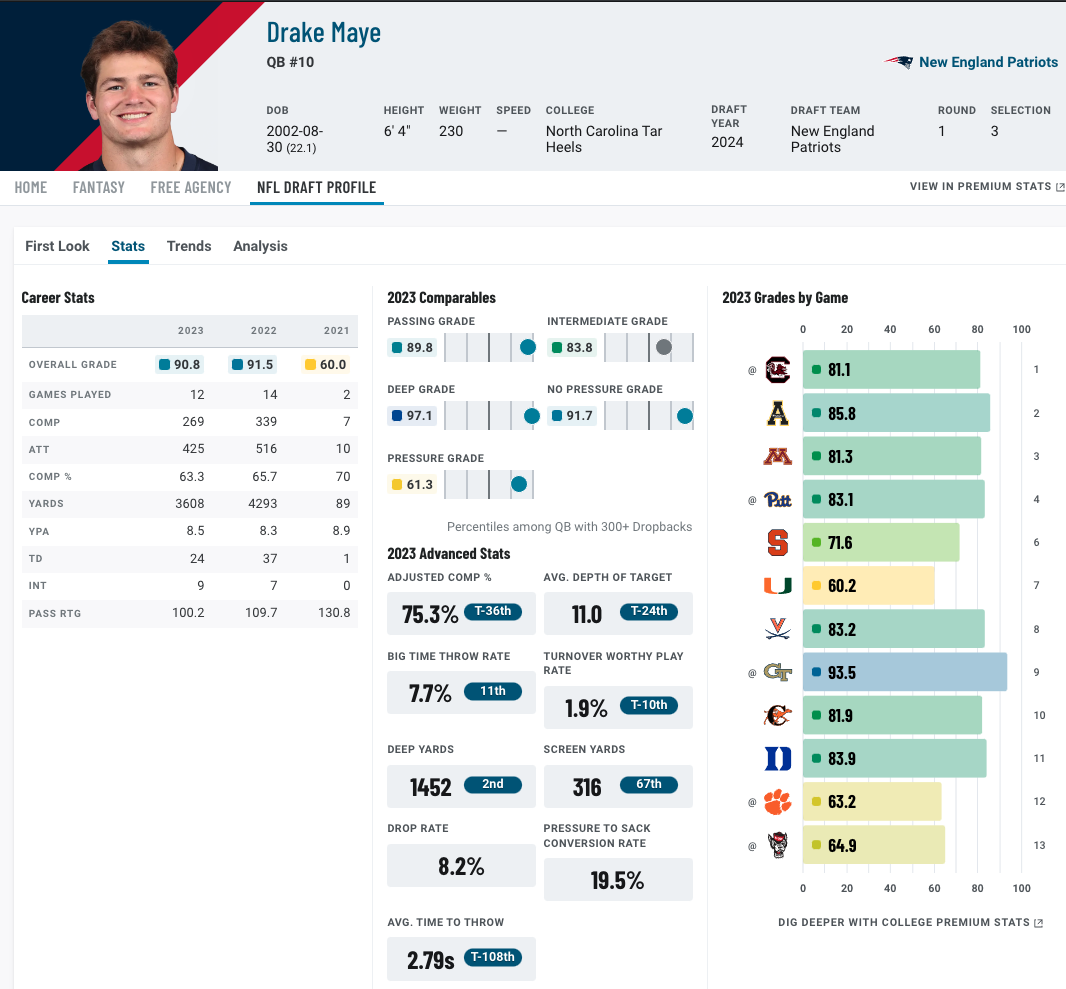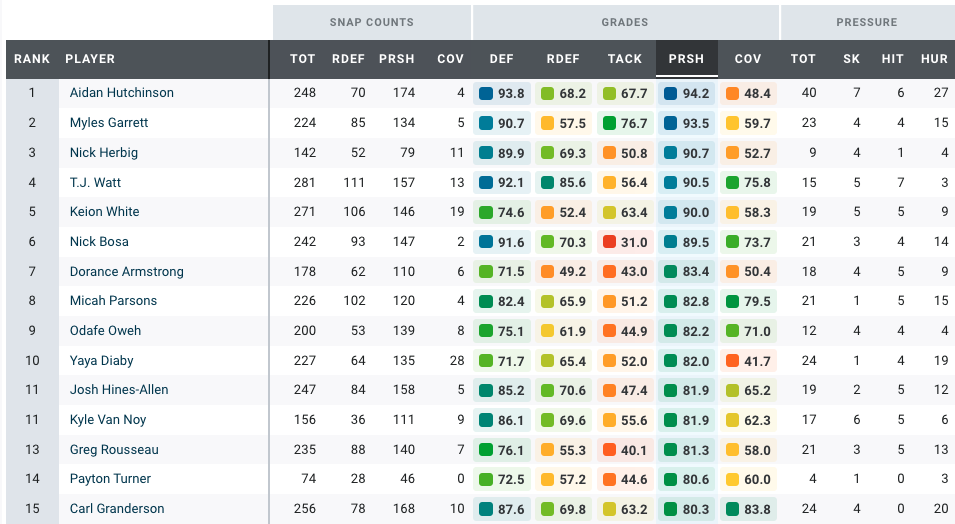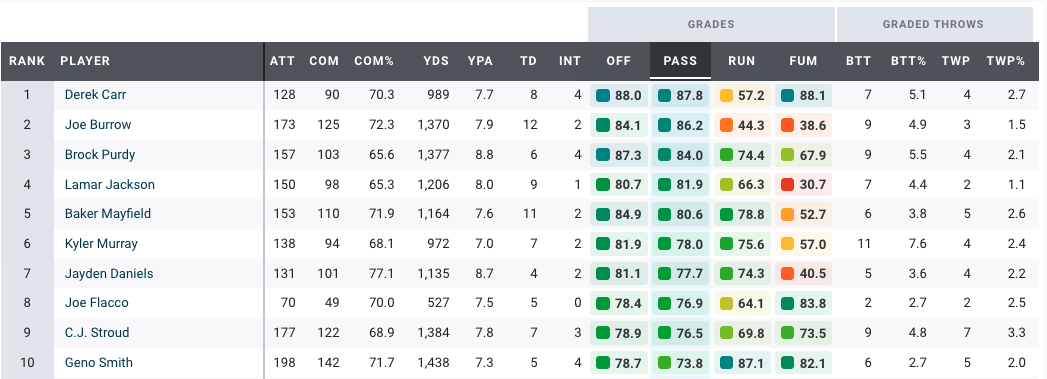


• Jordan Mason has stepped in admirably for the injured Christian McCaffrey: Mason’s 15% explosive run rate ranks fifth among the 17 San Francisco running backs who have recorded at least 75 carries in a single season under Kyle Shanahan since 2017.
• Drake Maye’s NFL debut presents a tough challenge: New England’s offensive line has struggled significantly in pass protection. Their 45.9% overall pressure rate is the highest in the league, and they also lead the NFL with a 31.9% quick pressure rate allowed, making life difficult for their quarterbacks.
• Unlock your edge with a PFF+ subscription: Get full access to all our in-season fantasy tools, including weekly rankings, WR/CB matchup charts, weekly projections, the Start-Sit Optimizer and more. Sign up now!
Estimated Reading Time: 4 minutes
For 17 years, PFF has built the most detailed football database in the world, analyzing every player on every play across the NFL, college football and beyond. Trusted by all 32 NFL teams and countless others, PFF provides the data that helps uncover the real story behind every game.
Ahead of NFL Week 6, our media team has dived deep into the numbers to deliver key insights for every NFL matchup, highlighting the hidden storylines and standout performances that shape each game.
To get even more insights into the NFL and college games, sign up for PFF+ and dive into Premium Stats 2.0.
SF@SEA | JAX@CHI | HOU@NE | PIT@LV | IND@TEN | CLE@PHI | TB@NO ARI@GB | WAS@BAL | LAC@DEN | DET@DAL | ATL@CAR |
CIN@NYG BUF@NYJ
Jordan Mason has stepped in admirably for the injured Christian McCaffrey, particularly in the run game. His 15% explosive run rate ranks fifth among the 17 San Francisco running backs who have recorded at least 75 carries in a single season under Kyle Shanahan since 2017. Additionally, Mason leads those backs in missed tackles forced per carry (0.24) and is fourth in yards after contact per carry, averaging 3.2 yards.
Seattle’s run game has thrived this season, thanks in large part to the dynamic duo of Kenneth Walker III and Zach Charbonnet. Despite ranking 29th in average yards per carry before contact (1.0), Seattle has been efficient when they break into the open field, boasting a 14% explosive run rate, the 7th best in the NFL. This unique combination makes them the only team with a top-10 explosive run rate and a bottom-10 ranking in yards before contact per carry.
Tank Bigsby’s 0.53 missed tackles forced per rush attempt leads all running backs this year. He’s also one of only three running backs averaging over 5.0 yards per carry while maintaining a stuff rate (percentage of runs stopped at or behind the line of scrimmage) of 20% or higher, joining Kenneth Walker III and J.K. Dobbins.
Since the start of the 2023 season, Cole Kmet boasts the lowest drop rate (1.0%) among 35 tight ends with at least 50 targets. His 61.5% contested catch rate ranks tied for sixth best over that same span.
Drake Maye’s NFL debut presents a tough challenge, as he faces a Houston defense that excels at generating quick pressure (pressure in under 2.5 seconds). The Texans boast a 25.9% quick pressure rate, ranking ninth-best in the NFL this season.
Meanwhile, New England’s offensive line has struggled significantly in pass protection. Their 45.9% overall pressure rate is the highest in the league, and they also lead the NFL with a 31.9% quick pressure rate allowed, making life difficult for their quarterbacks.

Brock Bowers was a first-down machine during his time at Georgia, tallying 114 receiving conversions from 2021 to 2023—25 more than any other FBS tight end over that period. He’s maintained that impact in his rookie NFL season, leading all tight ends with 15 receiving conversions and tying for 15th among all pass-catchers. The Steelers, however, have been strong against tight ends, allowing just seven receiving conversions on 22 targets—an impressive 22% conversion rate that ranks as the second-best in the NFL.
George Pickens has emerged as the Steelers’ most reliable downfield weapon this season. He has hauled in eight receptions for 217 yards on 13 targets of 10 or more yards, outpacing all other Steelers pass-catchers combined on such throws.
The Raiders have struggled against deep passes, allowing 28 receptions on throws of 10 or more yards—tied for the fourth most in the league — with a PFF coverage grade of 27.4, the second-lowest in the NFL against those attempts.
The Colts’ offensive line has been one of the best in the NFL this season. They have an 84.0 PFF run-block grade and an 82.7 PFF pass-block grade, both second in the league.
Quenton Nelson has returned to form, posting an impressive 88.8 run-blocking grade, making him the seventh-highest-graded interior lineman in that category — his first time exceeding an 80.0 run-block grade since 2020.
On the other hand, Tony Pollard has faced a challenging start to the season, often needing to make defenders miss as soon as he touches the ball. His -2 yards before contact ranks as the third-lowest among all NFL running backs, while his ability to elude tacklers has still shined, with 16 missed tackles forced, tied for seventh among all RBs.
Deshaun Watson‘s 3.09-second average time to throw is tied for the third slowest in the NFL this season, and his tendency to hold onto the football has made him a target for opposing defenses. He has absorbed 32 combined sacks and hits on dropbacks lasting over 3.0 seconds—14 more than any other quarterback. Meanwhile, the Eagles’ defense has struggled to capitalize on extended plays by opposing quarterbacks. On 32 snaps where quarterbacks held the ball for 3.0 seconds or more, the Eagles have managed just three hits or sacks—a 9% knockdown rate, the lowest in the league.
On offense, despite losing Jason Kelce, the Eagles’ offensive line has continued to excel in the run game, creating significant lanes at the line of scrimmage. Their unit boasts an 85.4 PFF run-blocking grade, the highest in the NFL, and they trail only the Ravens in yards before contact per rushing attempt (2.0).
In contrast, the Browns’ run defense has regressed. After allowing just 0.8 yards before contact per attempt last season (second-best in the league), that number has risen to 1.4 this season, ranking 10th-worst. This shift has contributed to the Browns allowing 23 runs of 10-plus yards, the second-most in the NFL.
Yaya Diaby has made a significant leap in his second season, recording 24 total pressures, the sixth most among all defensive players. His 25.6% win rate on pass-rushing snaps ranks fourth highest among qualifying edge defenders and marks a massive improvement from his rookie year in 2023, where his 7.5% pressure rate placed him 85th out of 104 players at the position. The increase of over 18% in win rate from 2023 to 2024 is the largest jump among qualifying edge players.
Alvin Kamara has seen a shift in usage this season, with 10 targets coming from a slot alignment, tying him with De’Von Achane among running backs in 2024. Kamara, who lined up in the slot on fewer than 5% of the Saints’ passing snaps during the 2022-23 seasons, has now increased that figure to 21% — his highest slot usage since his rookie year in 2017 when it was 23%.

Budda Baker’s 18 defensive stops rank first among safeties this season. Of those 18 stops, a position-best 12 have come against the run. Baker’s 81.4 run-defense grade ranks third highest among safeties, as well.
Meanwhile, Green Bay’s Xavier McKinney has emerged as the highest-graded safety this season (90.8). After playing at an elite level in coverage last year for the Giants, McKinney’s 90.7 coverage grade leads all safeties through five weeks, and his play is largely responsible for the Packers surrendering the seventh-lowest passer rating allowed this season (81.5).
Dan Quinn’s impact on Washington’s defense has been evident in the 2024 season. After ranking 31st in the league last year with a 29.8% pressure rate, the Commanders are now pressuring quarterbacks on 34.9% of dropbacks, ranking 18th overall.
The more notable improvement, however, is Washington‘s ability to convert pressures into sacks. They currently boast a sack conversion rate of 30.0%, ranking fifth in the NFL, along with an overall sack percentage of 8.7%, also fifth-best. For comparison, in 2023, Washington converted just 20.7% of their pressures into sacks (17th) and had an overall sack percentage of 5.6%, ranking 27th.
Lamar Jackson is on track for his most accurate passing season yet. He has posted a 60.2% accuracy rate on his pass attempts, surpassing his previous best of 57.7% in 2023. Since Todd Monken took over as offensive coordinator in 2023, Jackson’s charted accuracy has increased to 58.3%, up from the 54.2% mark during his 2018-2022 seasons.
Justin Herbert has faced a challenging season, contending with injuries and adjustments in the offensive system. Known for his ability to avoid risky throws, this season has been a departure from the norm. His turnover-worthy play rate has spiked to 4.7%, tied for the 6th highest in the league, a sharp contrast from the 1.9% rate he maintained from 2020-2023—the best among 32 quarterbacks during that span.
A key matchup this week will be the Broncos’ stout run defense against the Chargers’ run-heavy offense. Denver leads the NFL in EPA allowed per play on rushing attempts and has been tough to break through, allowing an explosive run rate of just 11.5%, ranking ninth-best in the league.
Detroit’s run game has been one of the best in the league, boasting a 40% successful run play rate this season, the third-highest among all 32 teams.
Meanwhile, the Dallas defense has struggled against the run, allowing a 37% success rate, which ranks 27th in the league.
The Dallas front will need to step up to contain both David Montgomery and Jahmyr Gibbs this Sunday. Since joining the NFL, Gibbs has been effective before contact, averaging 2.1 yards per carry before being touched, the second-best mark among running backs.
Dak Prescott’s accuracy has significantly improved over the past two weeks. Through Week 3, Prescott’s passes were only 49% accurate, placing him 31st among quarterbacks. However, in the last two games, his accuracy has surged to 70%, ranking sixth-best among his peers over that stretch.

The run game has been a key strength for the Panthers when they’ve been able to establish it this season. They rank fourth in the NFL with 4.7 yards per carry and 3.4 yards after contact per rush. Meanwhile, the Falcons’ run defense has struggled with tackling, missing 32 tackles—the third-most in the league—and giving up 418 yards after contact, the sixth-highest total in the NFL.
While Kirk Cousins may not have the same mobility as earlier in his career, he has excelled from inside the pocket, especially in his performance last Thursday against the Buccaneers. Since 2010, only two quarterbacks have recorded at least 40 completions, 500 passing yards, and four passing touchdowns on straight dropbacks in a single game: Kirk Cousins last week and Matt Schaub in Week 11 of 2012 against the Jaguars.
Cousins now faces a Panthers defense that has struggled against pocket passers, allowing a 115.9 passer rating — the second-highest among all defenses this season.
Joe Burrow has been nearly unstoppable against the blitz this season, completing 78% of his passes for an impressive 10.6 yards per attempt and a 143.3 passer rating — each of these marks leads all qualifying quarterbacks. However, he faces a challenge this week against a Giants defense that has thrived under new defensive coordinator Shane Bowen. The Giants’ blitz has generated a 50% pressure rate, second-best in the NFL, and they are tied for first with 13 sacks.
As for the Giants offense, third-year wide receiver Wan’Dale Robinson has become a key target from the slot. He has tallied 24 receptions and 11 receiving conversions from that position, placing him in the top three among all pass-catchers. Meanwhile, the Bengals have struggled to defend slot receivers, allowing a league-high 55% success rate on slot targets, making this a potential area of advantage for the Giants.
Josh Allen‘s passing game has taken a different shape this season, with a significant portion of his production coming after the catch. A notable 60% of Allen’s passing yards have come after the catch, ranking third among qualifying quarterbacks, and the Bills as a team are third in the league with 7.0 yards after catch per reception.
However, generating YAC will be challenging against a Jets defense that excels at limiting yards after the catch. This season, the team has allowed just 306 total YAC, 46 yards fewer than the next-best team.
Meanwhile, few quarterbacks have been quicker to release the ball than Aaron Rodgers, whose 2.5-second average time to throw ranks second-fastest in the league, trailing only Andy Dalton.
Rodgers has also been productive with this quick approach, leading the NFL with eight big-time throws on passes released in 2.5 seconds or less. He’ll be tested by a Bills pass rush that has consistently pressured quarterbacks quickly, ranking fourth in the NFL with 56 pressures occurring in under 2.5 seconds.